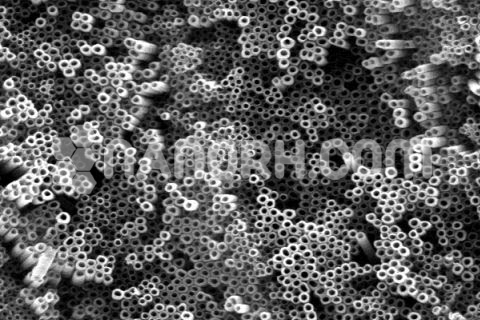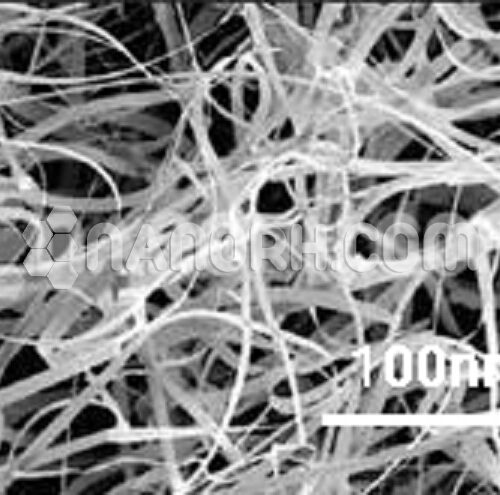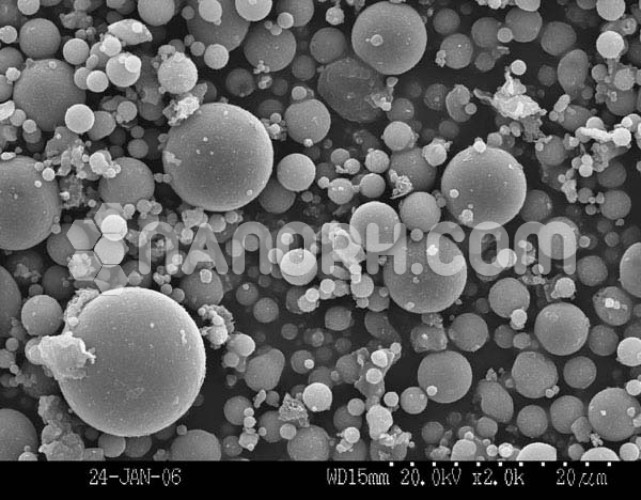Titanium Oxide Nanotubes
Titanium Oxide Nanotubes are a nanoscale form of titanium oxide with structure and properties similar to carbon nanotubes that make them ideal for use in solutions and semiconductor thin films with appplications in optics, electronics, transitors, and energy storage.
| TiO2 Nanotubes | |
| Product No | NRE-14021 |
| CAS No. | 13463-67-7 |
| Formula | TiO2 |
| Average diameter | 30-50nm |
| Average Length | up to 200µm |
| Purity | 99.9% |
| Molecular Weight | 79.9378 g/mol |
| Density | 4.23 g/cm³ |
| Melting Point | 1,843° C |
| Boiling Point | NA |
Titanium Oxide Nanotubes are a nanoscale form of titanium oxide with structure and properties similar to carbon nanotubes that make them ideal for use in solutions and semiconductor thin films with applications in optics, electronics, transistors, and energy storage. Elements produce too many standard grades when applicable, including Mil Spec, ACS, Reagent and Technical Grade; Food, Agricultural and Pharmaceutical Grade; Optical Grade, USP and EP/BP (European Pharmacopoeia/British Pharmacopoeia) and follows applicable ASTM testing standards. Typical and custom packaging is available, as is additional research, technical, and safety (MSDS) data. Please contact us for information on lead time and pricing above.
Applications:
Photocatalysis and Environmental Remediation:
Water Purification: TiO₂ nanotubes are highly effective at degrading organic pollutants in water through photocatalysis under UV light. This property is useful in water treatment systems for removing harmful substances like dyes, pesticides, and pharmaceuticals.
Air Purification: Similarly, TiO₂ nanotubes can be used to break down volatile organic compounds (VOCs) in the air, helping to improve air quality by acting as photocatalysts in air purifiers.
Hydrogen Production: TiO₂ nanotubes can also be used in photoelectrochemical cells for hydrogen production through water splitting, a clean and renewable energy source.
Energy Storage and Conversion:
Supercapacitors and Batteries: TiO₂ nanotubes are used as electrodes in supercapacitors and lithium-ion batteries due to their large surface area, high stability, and ability to intercalate ions. In particular, TiO₂ is often used in lithium-ion batteries as an anode material for enhanced cycling stability.
Solar Cells: TiO₂ nanotubes can be integrated into dye-sensitized solar cells (DSSCs), where they act as the photoanode. Their high surface area helps to increase the absorption of light and enhance the efficiency of the solar cells.
Fuel Cells: TiO₂ nanotubes can also be utilized in fuel cells for energy conversion, either as a catalyst or as part of the electrode material, improving the cell’s efficiency and stability.
Sensors and Detection:
Gas Sensors: TiO₂ nanotubes can be used in gas sensing applications due to their high surface area and sensitivity to environmental changes. These sensors can detect gases such as nitrogen dioxide (NO₂), ammonia (NH₃), and volatile organic compounds (VOCs), which are important in environmental monitoring and industrial applications.
Biosensors: TiO₂ nanotubes have been employed in biosensors for detecting biological markers or pathogens due to their biocompatibility and ability to functionalize with biological molecules.
Biomedical Applications:
Drug Delivery: TiO₂ nanotubes, with their high surface area and tunable pore sizes, can be used as carriers for drug delivery. Drugs or other bioactive molecules can be loaded into the nanotubes and released in a controlled manner, improving the efficiency of drug delivery to specific tissues or cells.
Antibacterial Coatings: TiO₂ nanotubes have inherent antibacterial properties. When exposed to UV light, they generate reactive oxygen species (ROS) that can kill bacteria, making them suitable for use in medical devices, wound healing, and implants.



